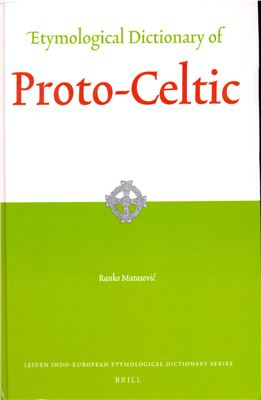Matasovic R. Etymological Dictionary of Proto-Celtic. Leiden,
Boston: Brill, 2009. - 458 p.
I began to work on this dictionary in May 2004, after a visit to the University of Leiden, when Sasha Lubotsky kindly invited me to participate in the "New Pokoy" project by taking care of the Celtic inherited lexicon. Feeling honoured, but also quite uncertain if I was up to the task, I accepted because I felt such a reference work was quite badly needed. Stokes' Urkeltischer Sprachschatz was published more than a century ago, and none of the other reference works on Celtic etymology provide an easy overview of the Proto-Celtic forms. I set to work when I retued to Zagreb, and within a year I produced a database of more than a thousand reconstructed Proto-Celtic words. At first my ambitions were not very high: I wanted to provide a list of reliable Celtic etymologies for Indo-Europeanists to use, largely by sifting through the various etymological proposals found in reference works published during the last half a century. The initial versions of the database thus contained almost only uncontroversial etymologies, and very few new proposals. However, it soon began apparent that adding more material and telling apart reliable etymologies from obviously false ones was impossible without a clear picture of what Proto-Celtic looked like, and so my attention was gradually shifted towards the problems of reconstruction of Proto-Celtic. This then required an in-depth study of the historical phonology of the Celtic languages and a substantial filling of the gaps in my education as a Celticist and Indo-Europeanist, so the final redaction of the dictionary was delayed for two years. Much of the work I had done previously had to be revised after I had finally decided which Proto-Celtic sound changes should be accepted. The list of the Proto-Celtic sound laws is explicitly adduced in the Introduction to the dictionary, and all etymologies in this dictionary are based on the assumption that those sound laws operated in Proto-Celtic. Although details of the list may be controversial - there simply is no consensus among scholars in all aspects of Celtic historical phonology - at least it provides a degree of consistency in the etymological treatment of words included in this dictionary.
I began to work on this dictionary in May 2004, after a visit to the University of Leiden, when Sasha Lubotsky kindly invited me to participate in the "New Pokoy" project by taking care of the Celtic inherited lexicon. Feeling honoured, but also quite uncertain if I was up to the task, I accepted because I felt such a reference work was quite badly needed. Stokes' Urkeltischer Sprachschatz was published more than a century ago, and none of the other reference works on Celtic etymology provide an easy overview of the Proto-Celtic forms. I set to work when I retued to Zagreb, and within a year I produced a database of more than a thousand reconstructed Proto-Celtic words. At first my ambitions were not very high: I wanted to provide a list of reliable Celtic etymologies for Indo-Europeanists to use, largely by sifting through the various etymological proposals found in reference works published during the last half a century. The initial versions of the database thus contained almost only uncontroversial etymologies, and very few new proposals. However, it soon began apparent that adding more material and telling apart reliable etymologies from obviously false ones was impossible without a clear picture of what Proto-Celtic looked like, and so my attention was gradually shifted towards the problems of reconstruction of Proto-Celtic. This then required an in-depth study of the historical phonology of the Celtic languages and a substantial filling of the gaps in my education as a Celticist and Indo-Europeanist, so the final redaction of the dictionary was delayed for two years. Much of the work I had done previously had to be revised after I had finally decided which Proto-Celtic sound changes should be accepted. The list of the Proto-Celtic sound laws is explicitly adduced in the Introduction to the dictionary, and all etymologies in this dictionary are based on the assumption that those sound laws operated in Proto-Celtic. Although details of the list may be controversial - there simply is no consensus among scholars in all aspects of Celtic historical phonology - at least it provides a degree of consistency in the etymological treatment of words included in this dictionary.

